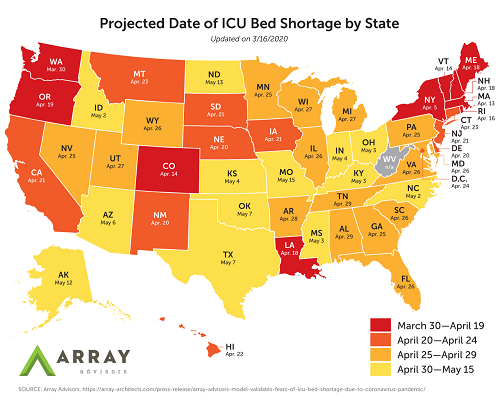See When States Will Face Hospital Bed Capacity Shortages During COVID-19 Outbreak
By Jack O’Brien
Amid the ongoing coronavirus disease 2019 (COVID-19) outbreak, most states will run out of available intensive care unit (ICU) hospital beds by mid-April, according to a new analysis by Array Advisors.
Washington, a state with the second-most confirmed cases in the country as of Monday afternoon, is expected to hit its ICU capacity by March 30. New York, a state with over 930 cases, is expected to hit its capacity by April 5.
Meanwhile, nearly 20 more states are expected to hit their ICU bed capacity between April 13 to April 23, according to the analysis. Missouri is expected to face an ICU bed shortage by May 7, the latest of any state in the country.
The analysis factored in a state’s current confirmed cases, age of population, as well as existing ICU and medical-surgical bed capacities.
Array Advisors called for provider organizations to take immediate action to combat the spread of the virus, which has caused significant clinical and financial damage in recent weeks.
The Conshohocken, Pennsylvania–based healthcare company stated that if the virus spreads faster than expected or states do not choose to cancel elective medical procedures, these bed shortage projections might occur sooner than expected.
“Our analysis emphasizes the narrowing window of time left for all states to expand their capacity to care for patients requiring hospitalization,” Array Advisors stated in a cover letter. “While these numbers may be alarming, they intensify the healthcare industry’s call for urgent action.”

Like the expected ICU bed shortages, states will also begin to face medical-surgical hospital bed shortages by the second week of April.
Again, Washington is projected to be the first state to face a medical-surgical bed shortage, according to the study. North Dakota is projected to be the last state to face a shortage, which is expected to occur by May 31.
While acknowledging concerns around the continued disruption posed by the spread of the virus, Array Advisors suggested that there are practical options to increase available bed capacity going forward, such as “leveraging our military’s facilities and its thousands of medics” to assist during the pandemic.
The analysis also pointed to New York State’s recent announcement that it could create space to care for an additional 1,100 patients, as well as the Cleveland Clinic’s contingency plans to utilize a hotel for an additional 1,000 beds.
For the most part, states will benefit from President Donald Trump’s recent national emergency declaration, according to the study, which makes $50 billion available for efforts to fight the coronavirus.
It also provides hospitals with waivers for restrictions on telehealth usage, the requirement that critical access hospitals have a 25-available-bed limit for patients, and a maximum length of stay of 96 hours for inpatients.
Still, Array Advisors stated that most hospitals face staffing shortages, which will hamper any efforts to provide critical care to patients. The analysis suggests that canceling elective surgeries is the most effective step for hospitals to boost available bed capacity and combat the spread of COVID-19.
“We understand that this drastic measure will inconvenience patients who are suffering and will, in some cases, pose a real clinical risk, but it appears we have no choice but to start taking those calculated risks today,” Array Advisors stated. “We also understand that this will put significant economic stress on hospitals and health systems and hope that future federal stimulus will include provisions to ensure organizational sustainability.”
Jack O’Brien is the finance editor at HealthLeaders, a Simplify Compliance brand.
